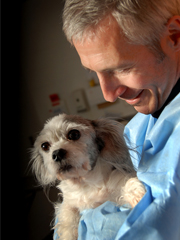Bringing Animal – and Human – Medicine into the 21st Century
NC State’s Small Animal Veterinary Teaching Hospital (VTH) treats more than 20,000 small animal patients every year. That’s a lot of dogs, cats, turtles, birds, hamsters and fish; in fact, it’s about 11,000 patients a year more than the original VTH was designed to handle when it was built in 1983.
But patient volume isn’t the only thing that’s changed since 1983 – veterinary medicine has become increasingly specialized, and its advances in treatments for animal patients have benefited human patients as well. NC State has been at the forefront of much of this research, and with the dedication of its new Randall B. Terry, Jr. Companion Animal Veterinary Medical Center on May 6, NC State will solidify its position as a national leader in veterinary health.
Open video in YouTube | Transcript [doc] | Video from NC State YouTube
Coming in at 110,000-square-feet, the Terry Center addition will more than double the current size of NC State’s small animal VTH, making it one of the largest, most technologically advanced veterinary facilities in the country. The new medical center will double the number of exam rooms and surgery suites previously available, and will add expanded patient visitation areas, dedicated teaching space, and a spacious new pharmacy.

Enhanced medical technologies that will be available to patients include: a biplane fluoroscopy unit for better visualization of complex structures – such as congenital heart defects – for more accurate and faster placement of interventional devices; a new linear accelerator for precision treatment of a variety of cancers; a 64-slice Computed Tomography CT Unit for high-resolution imaging; copper-shielded rooms required for neurological and opthalmological diagnostics; high flow air filtration to protect patients with infectious diseases; and a dedicated canine bone marrow transplant unit.
According to Dr. Michael Davidson, Associate Dean and Director of Medical Services, the Terry Center, in addition to offering the best treatment available to its animal patients, is a key piece of NC State’s new Centennial Biomedical Campus, a network of corporate, government and academic partners dedicated to medical research.
“The Centennial Biomedical Campus is an extension of NC State’s Centennial Campus concept, which promotes public and private research partnerships,” Davidson says. “The Terry Center’s cutting-edge design and expansivenesss will enhance our ability to carry out the clinical and research studies that benefit humans and animals.”
The four-year, $72 million project was made possible, in part, by a $20 million donation from the R.B. Terry, Jr., Charitable Foundation – one of the largest private gifts ever given to NC State.


